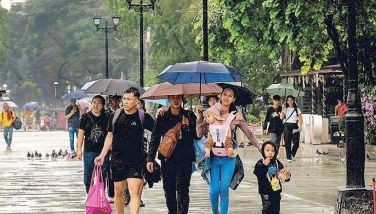South Korea hopes for sea code of conduct
MANILA, Philippines - South Korean Defense Minister Han Min-koo is looking forward to the completion of a binding code of conduct for parties in the South China Sea even as he called on claimants to respect each other as they try to resolve the territorial row.
Han yesterday noted that the South China Sea is important for South Korea since 90 percent of its petroleum trade and 30 percent of its total trade pass through the area.
“It is my stance that the relevant nations surrounding this area and this situation should solve this situation based on mutual respect towards each other’s sovereignty and mutual cooperation and mutual understanding of each nation’s perspective,” Han said in a press conference at Camp Aguinaldo.
“I also believe that parties should act in accordance with the DOC (Declaration of Conduct) that has already been made and I also look forward to the speedy conclusion of the code of conduct concerning the South China Sea,” he added.
The South China Sea, which the Philippines calls the West Philippine Sea, is a busy sealane where more than $5 trillion worth of trade pass through every year.
China claims virtually the entire potentially oil- and gas-rich area while the Philippines, Vietnam, Malaysia, Brunei and Taiwan have overlapping claims.
In 2002, the Association of Southeast Asian Nations (ASEAN) and China signed the Declaration on the Conduct of Parties in the South China Sea in a bid to resolve the territorial row peacefully.
The declaration bars any claimant from engaging in any activity that will change the status quo in disputed areas. However, binding and specific guidelines have yet to be crafted despite expressions of commitment from claimants.
Han, who met with Defense Secretary Voltaire Gazmin yesterday as part of his two-day visit to the Philippines, said that while Asia has seen stronger economic ties, some work is needed to enhance security cooperation in the region.
“Asia, especially East Asia, is an area which attracts the eyes of the world. And to give an assessment of that region of Asia, the security in Asia is such that economic cooperation has been deepening for some time now, but the security operation has not been up to speed. We call this phenomenon the Asia paradox,” Han said.
“I believe the situation that we have in the South China Sea can be understood in the framework of such phenomenon known as Asian paradox,” he said.
Han said South Korea is ready to support efforts to maintain stability in the region. – With Jaime Laude
- Latest
- Trending






























